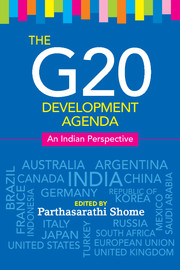Book contents
- Frontmatter
- Contents
- List of Tables and Figures
- Preface
- Section 1 Introduction
- Section 2 The Development Agenda
- Section 3 Energy Security and Environmental Sustainability
- 6 The Co-benefit Principle and the Durban Platform: Towards an Inclusive Framework for Negotiating Climate Finance
- 7 Greening the G20 Agenda: A Way Forward
- 8 Revisiting Fossil–Fuel Subsidies in the Context of Ongoing G20 Dialogue
- 9 Should India Join the International Energy Agency?
- Contributors
- Index
9 - Should India Join the International Energy Agency?
from Section 3 - Energy Security and Environmental Sustainability
Published online by Cambridge University Press: 05 May 2015
- Frontmatter
- Contents
- List of Tables and Figures
- Preface
- Section 1 Introduction
- Section 2 The Development Agenda
- Section 3 Energy Security and Environmental Sustainability
- 6 The Co-benefit Principle and the Durban Platform: Towards an Inclusive Framework for Negotiating Climate Finance
- 7 Greening the G20 Agenda: A Way Forward
- 8 Revisiting Fossil–Fuel Subsidies in the Context of Ongoing G20 Dialogue
- 9 Should India Join the International Energy Agency?
- Contributors
- Index
Summary
Introduction
India's membership of the G20, a grouping of major nations set up by expanding the original G8 of the world's largest economic powers, to deliberate upon, and where possible, cooperate on issues of global concern, both enhances India's role in world affairs, as well as imposes possible constraints on policy actions by India.
One of the significant issues before the G20 is the issue of global energy security, which at the present time revolves around the twin poles of security of global petroleum supplies, and the sharing of burdens for mitigation of climate change. In respect of security of petroleum supplies, a key player, hitherto comprising solely present OECD members, is the IEA. There have been suggestions that it is now time for India, China, and possibly Russia to become members of the IEA, on account of their increasing salience in the global oil market. However, the costs and benefits of such membership must be carefully weighed, before a decision is taken to avail of the responsibilities of such membership.
This chapter discusses the pros and cons of India joining the IEA, including possible governance reform of the IEA as a prerequisite of such membership.
The chapter discusses the IEA's origin, mandate, and core mission. It also presents the long-term global oil supply outlook as well as discusses an important emerging global energy option, shale gas. The following section gives an account of India's energy challenges, discusses the prospects of admission of new members to the IEA, summarizes the pros and cons of membership, as well as governance reforms that could be insisted upon as prerequisite to membership of India (and China). It also discusses India's options for cooperation with the IEA without formal membership.
IEA's origin, mandate and core mission
The IEA was established following the first oil price shock of the 1970s; to coordinate emergency supply measures and improve the governance of long-term energy issues. Its core mission is to ensure secure energy supply for its members (presently: advanced industrial countries comprising the OECD).
- Type
- Chapter
- Information
- The G20 Development AgendaAn Indian Perspective, pp. 256 - 300Publisher: Cambridge University PressPrint publication year: 2015

